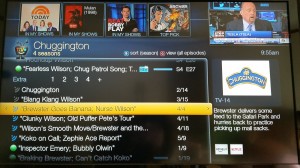There’s a famous quote that says, “If you can’t explain it simply, you don’t understand it well enough.” That statement is true. But I’m sure many of us have examples of where we’re challenged to explain something we know very well in a simple manner.
Take the example of working in technology and explaining what you do to family or friends who are in completely different fields. Can you easily explain virtualization, for example, to your car mechanic? What about explaining the concepts of hybrid cloud to an airline pilot (who has an altogether different view of clouds)?
Usually, the easiest way to explain a complex subject to someone who has never been exposed to it is to put it into terms of examples that they already understand. And so it was that I found myself talking with my wife about the benefits of hybrid cloud in terms of our TiVo DVR.
For years we’ve used TiVo to record shows for ourselves and our kids. TiVo has had a feature called Season Pass that automatically records all episodes of a TV show when they air on a particular channel. Recently, TiVo upgraded the Season Pass into a new feature called OnePass that brings together content on your TiVo with content available via streaming services like Netflix and Amazon.
We were recently at a party where someone recommended we watch a show we had never heard of. When we got home we decided to record it, and we got to see how the OnePass feature worked with this new show. The feature would allow us to record all new episodes of the show directly on our TiVo while also allowing us to use streaming services to catch up on the previous season that we haven’t seen. It does this all from the same familiar interface, grouping the newly recorded episodes and those episodes available from streaming services together into the same view.
 You can see an example of what this looks like using my son’s favorite show Chuggington. From the same view, I can choose to stream episodes from multiple sources (in this case Amazon and Netflix, as shown in the lower right) indicated by the three little blue lines next to the name of the show. Or I can watch episodes I already recorded on my TiVo as indicated by the green dot next to each episode. It works great—I get all of the content that I want in one interface that I’m already familiar with.
You can see an example of what this looks like using my son’s favorite show Chuggington. From the same view, I can choose to stream episodes from multiple sources (in this case Amazon and Netflix, as shown in the lower right) indicated by the three little blue lines next to the name of the show. Or I can watch episodes I already recorded on my TiVo as indicated by the green dot next to each episode. It works great—I get all of the content that I want in one interface that I’m already familiar with.
Lest you think this is just a blog post advertising TiVo, let me bring it back to hybrid cloud. Those of you already familiar with the Federation Enterprise Hybrid Cloud probably already see the connection here. What TiVo has done with the OnePass feature is provide choice, allowing us to record shows directly on our TiVo (on-premises infrastructure) while also letting us consume content from streaming services (off-premises cloud) all from the same interface. We could make the decision to use paid services like Netflix to catch up on old episodes, or simply record them directly on the TiVo (at no extra cost above our normal cable bill) when they air again.
The Federation Enterprise Hybrid Cloud provides that same type of functionality. You can choose to deploy workloads or services on-prem or use public clouds like vCloud Air all from the same interface. Consumers of cloud services usually don’t care where the workload runs, they just want the ability to consume it based on criteria like cost, data protection, recovery levels, or performance just to name a few. We talk a lot about how the Federation Enterprise Hybrid Cloud provides choice, and this is an easy-to-understand example of how we provide that choice.
Of course, Federation Enterprise Hybrid Cloud doesn’t just stop at the creation of workloads. Cloud consumers can choose to back up or restore provisioned workloads on demand. They can also provision entire application stacks in a fraction of the time that it would have taken without a cloud infrastructure. And they can do this while having the visibility into the costs for all of the decisions that they make, helping them decide upon the most appropriate place for their workloads to run.
And so I bring it back to where I started. Hybrid cloud can be a complex topic. But I was able to explain it to my wife in terms she is familiar with, and she instantly understood the benefits. On that night everybody won—I got to explain the benefits of hybrid cloud in a new way that gave me the idea for this blog post, and we ended up with a new show to watch. Now if she’d ever give me the remote control, I might actually be able to watch it.
